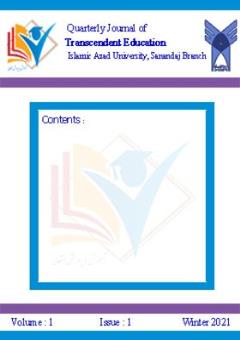Prediction of learning quality based on virtual education and computer self-efficacy with the mediating role of knowledge sharing among secondary school teachers in district 2 of Shiraz city
Subject Areas : Education
سپیده صفرپور دهکردی
1
![]() ,
elham karimi
2
,
elham karimi
2
1 - گروه تکنولوژی آموزشی،واحد شیراز،دانشگاه آزاد اسلامی،شیراز ،ایران.
2 - Master of Educational Technology, Shiraz Branch, Islamic Azad University, Shiraz, Iran.
Keywords: Learning quality, virtual education, computer self-efficacy, Sharing knowledge,
Abstract :
This research was conducted with the aim of predicting the quality of learning based on virtual education and computer self-efficacy with the mediating role of knowledge sharing among secondary school teachers of district 2 of Shiraz cityThe research method was correlational in terms of data collection. The statistical population of the present study included all secondary school teachers of the 2nd district of Shiraz city in the academic year of 2022-2023, whose number is estimated to be 1800 with reference to education. 320 of the studied teachers were selected as a sample by stratified random sampling method. The tools used in this research were the quality of learning questionnaires by Janes et al. (2007), virtual education by Yadolahi et al. (2021), computer self-efficacy by Murphy et al. (1989) and knowledge sharing by Kim and Lee (2013). The face and content validity of the questionnaire was confirmed by experts and technical people, and the reliability was confirmed by Cronbach's alpha method. Descriptive statistics (mean and standard deviation) and inferential statistics (Pearson's correlation coefficient and linear and hierarchical regression and path analysis) were used to analyze the data.The research results indicated that virtual education and computer self-efficacy can significantly predict the quality of learning and the significant mediating role of knowledge sharing in the relationship between the variables of virtual education and computer self-efficacy with learning quality was confirmed. It is also possible to confirm the assumption that virtual education, computer self-efficacy and knowledge sharing are able to predict the quality of


